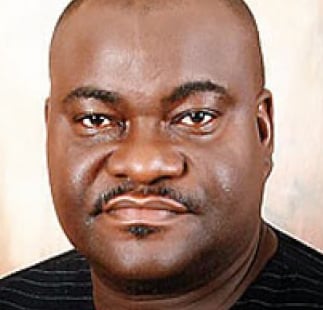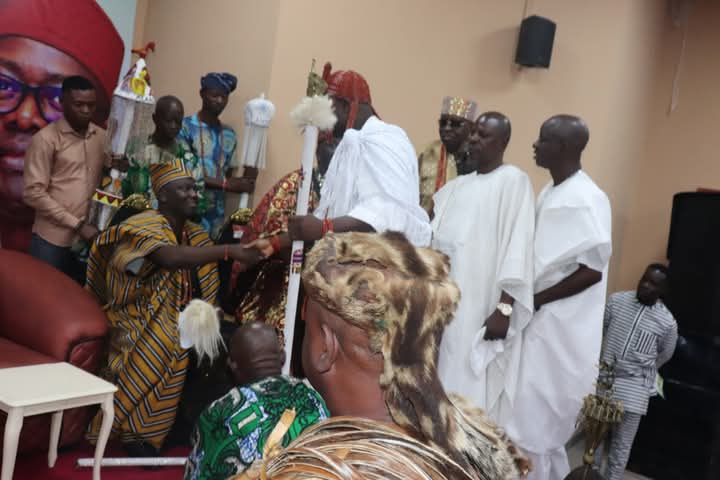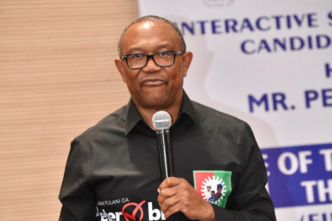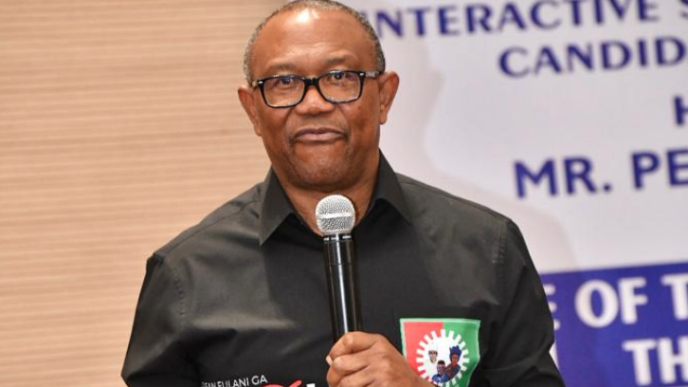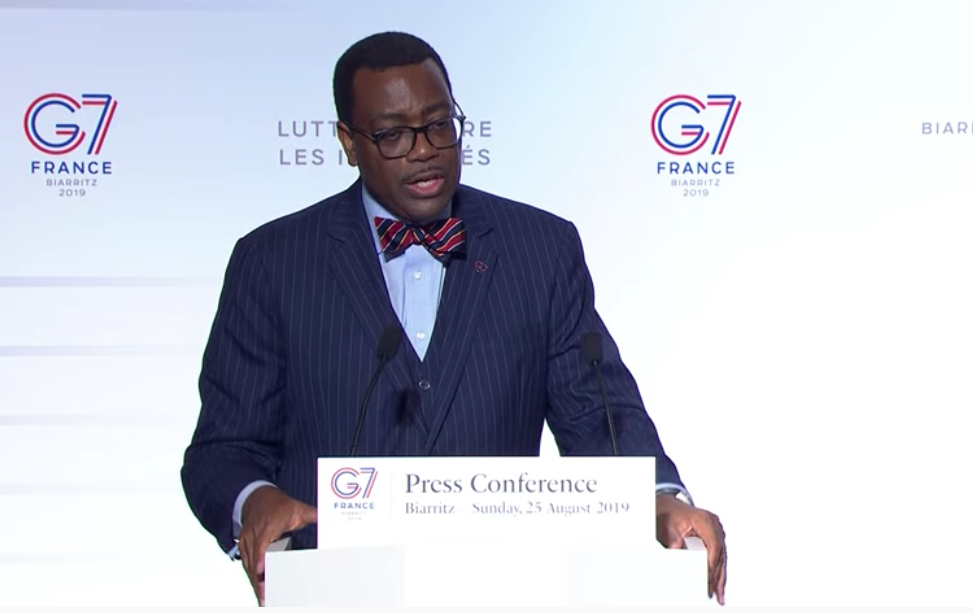Alaafin of Oyo, Oba Abimbola Owoade seated while greeting Ooni of Ife, Oba Adeyeye Enitan Ogunwusi at an event in Oyo
Royalty enjoyed tremendous reverence when my generation was growing up. As a schoolboy in Benin City those days, the Oba savoured profound reverence and conjured trepidation amongst his subjects. He was and still is introduced with the prefix Omo N’Oba N’Edo Uku Akpolokpolo. Much as this simply means “His Royal Majesty, the Oba of Benin,” it is without doubt, a jarring mouthful. He is regarded as sole emissary of the supreme deity and possibly a god in his own right, most probably consecrated by cosmic consent.
Oba Akenzua II was on the throne in my teenage days in Benin City. He loomed large in the public consciousness who barely caught a glimpse of him anywhere. The wholesale mythification of his office was such that his name was conjured to serve as warning and deterrent to potential rabble rousers. The now popular phrase, You go see Oba was added to day-to-day, now globalised conversational lexicon in my time. It served as deterrent to mischief and errant conduct. The lawless were thus admonished on circumspection, lest they had to go through the labyrinthine motions of seeking justice or redress before a barely ever seen Oba.
I equally keenly followed the trajectory of the immediate past Ooni of Ife, Oba Okunade Sijuwade, Olubuse II. Immensely affluent, urbane and classy, he brought elan, style and panache to bear on his office. He was famous for his striking regalia, typically complemented by corresponding accessories and adornments. He breathed style and elegance. The very popular Forbes magazine indeed once rated Ooni Olubuse as the “third richest royal in Africa” in his time. I was privileged to meet him a few times during his lifetime. I was still a student and member of one of our departmental students associations in school when I had the first encounter with him. Despite his impeccable proficiency in the English language, Oba Sijuwade elected to speak Yoruba during most of his engagements. This linguistic preference reinforced the belief that he was truly the mouthpiece of the gods and ancestors. There was always, ever a competent interpreter by his side, usually his long-serving Press Secretary, Funmilola Olorunnisola, himself a ranking Chief of Ile-Ife. The Ooni conveyed his thoughts and messages through him to his guests and audiences.
Contemporary royals have dominated the news in recent days and weeks. The manifest unseemly conduct of some of them, is totally at variance with their standings and statuses as traditional rulers. Indeed, their actions in many instances have unwittingly whittled down the historical dignity of the exalted stools they occupy, in the catacombs of otherwise revered palaces. Such custodians of tradition have unknowingly transposed their venerated seats, to the full glare of the public, the marketplace. From Ipetumodu to, Ibadan, to Oyo and to Katsina, in Osun, Oyo and Katsina states respectively, presumed royals have shown up in ways and manners which demean and diminish their offices. Such wholesome devaluation is of necessity impacting the very essence of the institution of natural rulership, passed down from ages and aeons.
Advertisement
The Apetu of Ipetumodu, Oba Joseph Oloyede, was arrested by United States security early 2024 for his role in obtaining COVID-19 relief funds estimated at $4.2million, fraudulently. While his subjects anticipated the return of their king from what was supposed to be a routine visit to the US, Oloyede had been answering charges before Justice Christopher Boyko, of the US District Court of Ohio. He reportedly colluded with a certain Edward Oluwasanmi, a Nigerian-American clergyman, with whom he defrauded the US system of resources designated as buffer for US small businesses and nonprofit organisations experiencing pandemic-related revenue losses. Court documents reportedly referenced falsified applications for “Paycheck Protection Programme Loans and Economic Injury Disaster Loans, under the US Coronavirus Air, Relief and Economic Recovery Act” submitted by Oloyede and Oluwasanmi.
Both men deployed fake tax and wage documents to secure funds intended to help struggling businesses keep afloat during the COVID-19 plague. Oloyede received about half of the $4.2million, scammed by him and his compatriot, Oluwasanmi. He reportedly invested his portion of the heist in real estate in the US. Oloyede by the way, was installed the Oba of his community in 2019. His profile as a travelled and affluent person counted amongst other considerations for the 62-year old monarch. His present engagement with the US justice system may yet torchlight other probable underhand financial dealings in the course of his long sojourn in the country in which earned him a residency. This is as his subjects remain in shock and bewilderment over such unsavoury revelations concerning a leader they once exalted.
The Ooni of Ife, Oba Adeyeye Enitan Ogunwusi, the Ojaja II, recently had a spat with the Alaafin of Oyo, Oba Abimbola Owoade at an event in Ibadan. Wife of the President, Oluremi Tinubu was guest of the Oyo State Government and both monarchs were invited to the programme. As the Ooni made his way to his seat, every traditional ruler on his route honoured him by rising to welcome him. The Alaafin, however, refused to rise up, even as he shook hands with the Ooni from his seating position. There is a long history about the rivalry for preeminence between the Alaafin and the Ooni. It was partially resolved when the administration of President Ibrahim Babangida created two states, Oyo and Osun, out of the erstwhile Oyo State. Both rulers were venerated as the Numero Uno monarchs in the various states. As the Ibadan incident revealed, however, animosity abounds between the Ooni who is 50, and the Alaafin who is 49, beyond the historical acrimony. A more recent reason has been adduced for the beef between both royals.
Advertisement
Decades ago, a US-based Nigerian of Yoruba descent, Efuntola Oseijeman Adelabu Adefummi, conceived of a “Yoruba village” to serve as a melting pot for Yorubas in the US. It was supposed to be a “home away from home” where the Yoruba essence will be celebrated. This vision berthed the Oyotunji African Village located in Beaufort County, South Carolina, in 1970. Efuntola Adefunmi the visioner was installed Oba of the “village.” Ooni Ojaja has in the past, been requested by the leadership of Oyotunji to mediate during disputes and conflicts plaguing the village and he had always willingly sent emissaries. It has been suggested that Alaafin Owoade has been wrongfully briefed that his rulership of Oyo, encompasses Oyotunji which in reality is an address for all Yorubas from Nigeria, Benin Republic, Togo, Brazil and so on. This has been adduced as probable reason for the grouse between both men.
A recent incident where one Chief Lukman Ojora Arounfale, the Baba Oba of Oyotunji African Village was allegedly assaulted in the Alaafin’s palace on the orders of the king, lends credence to the bile between him and the Ooni. The scenario which played out on Thursday April 17, 2025, was linked to the bitterness between the Alaafin and the Ooni. It fits the narrative that the Alaafin in reality conceives of Oyotunji as a diaspora extension of his kingdom. Chief Lukman Atounfale, we are told, died from injuries he sustained in the brutal attack on him and his wife, in the Alaafin’s abode in Oyo. Such are the dimensions of controversies which have trailed the teething weeks and months of the reign of Alaafin Owoade who was only installed in January 2025, by Governor Makinde.
Overzealous palace guards, dogarai, working for the Emir of Katsina, Abdulmumini Kabir Usman last weekend, broke the glass entrance into the Katsina home of Dikko Radda, Governor of the state. Radda had given out one of his daughters in marriage earlier that day and was hosting dignitaries including President Bola Tinubu to a reception at his address. State protocol and security regulations prescribe that once the President or guest-in-chief is already seated at a function, late comers are shut out. It was bad enough that Emir Kabir Usman came long after the nation’s chief executive was already settled. It was worse that his fatawa dared to bring down a section of the home of the chief host of the President. It was an utterly disrespectful act which underlined the operational manual in effect in the palace of the Emir. Let’s hope the Emir has sent pertinent formal apologies to Tinubu and Radda, principally.
At every opportunity, traditional rulers are known to have canvassed specific roles for themselves in the Constitution of the Federal Republic of Nigeria. This seems plausible given their proximity to the mass of Nigerians especially in the distant hinterlands and deep recesses of our vast national space. Against the backdrop of reported misuse of authority which we recently gleaned in the palace of the Alaafin, can our royals be trusted to manage gazetted authority? Two weeks after the assault and subsequent demise of Lukman Ojora Arounfale which was ascribed to Alaafin Owoade, we are yet to read a rejoinder. Wouldn’t aides of natural rulers like Dr Kabir Usman of the Katsina emirate, incorporate bulldozers in the vehicular convoy of their Principal as they journey through the emirate? The roofs of the homes of many of the Emir’s subjects who are in the quietude of their sanctuaries, may just be decapitated for not being on the streets paying obeisance to the king?
Advertisement
Our royals must reinvent themselves and re-perspectivise their offices. They are not “Highnesses” and “Majesties” simply for personal ennoblement. Their positions and honorifics bear immense relevance to the history and sociocultural identities of our diverse peoples. The onus is on them to restore relevance and reverence to our traditional institutions in a global sense. It is their responsibility to protect and preserve our cultures from adulteration, abuse and extinction. We should not pass down diminished and dismembered histories, narratives and beliefs, to successor generations.
Olusunle, PhD, Fellow of the Association of Nigerian Authors, (FANA), teaches Creative Writing at the University of Abuja
Views expressed by contributors are strictly personal and not of TheCable.
